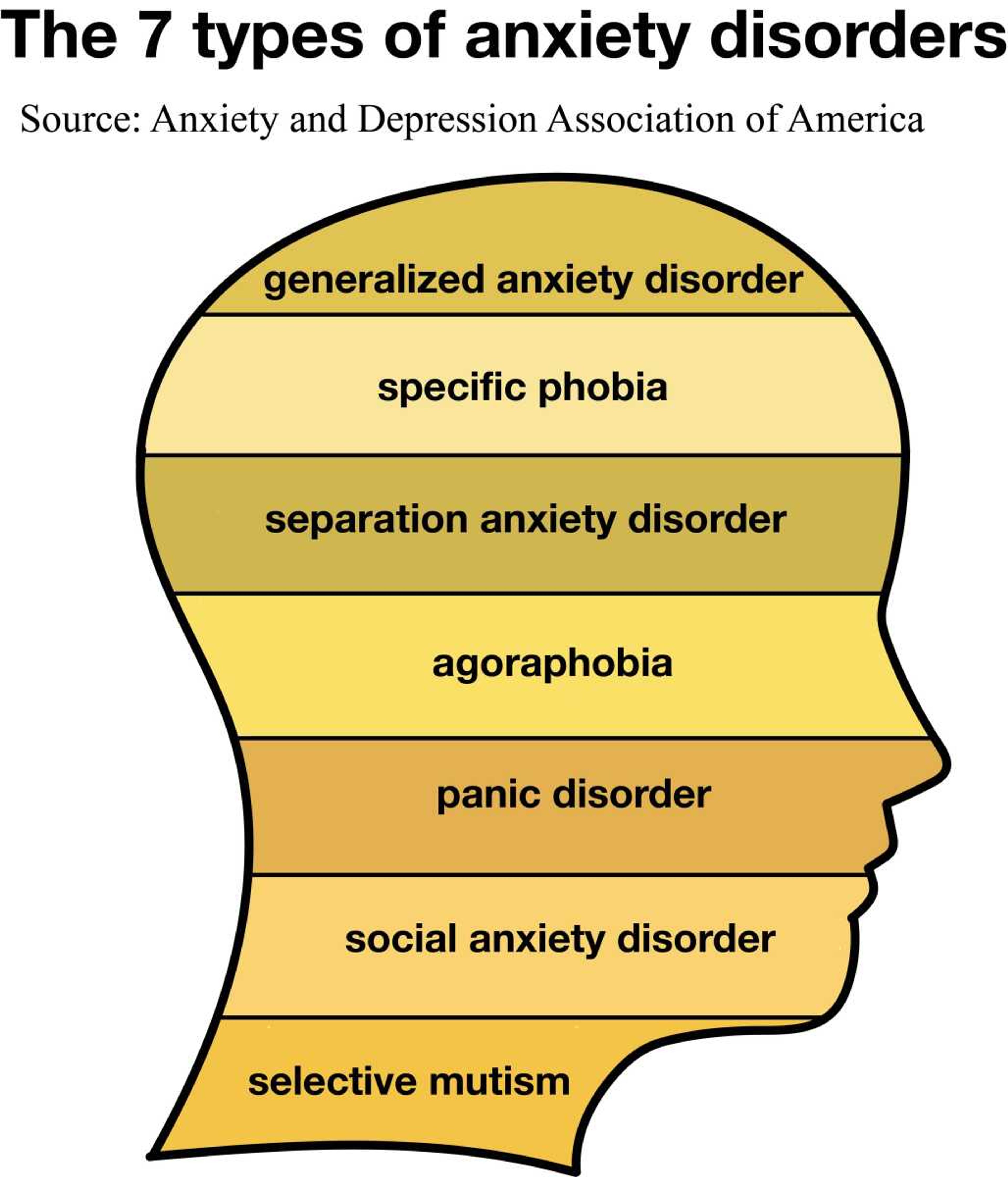Anxiety affects lives at Southeast, faculty suggest students ‘cut yourself some slack’
Anxiety disorders affect about 40 million, or 18% of American adults every year.
Anxiety disorders affect about 40 million, or 18% of American adults every year.
Anxiety disorders are a group of mental disorders associated by feelings of anxiety and fear. Symptoms may include fast heart rate, sweating, shakiness, and panic attacks, according to Anxiety and Depression Association of America. Anxiety and Depression Association of America says that anxiety disorders fall under seven categories: generalized anxiety disorder, specific phobia, separation anxiety disorder, agoraphobia, panic disorder, social anxiety disorder and selective mutism. Oftentimes, people have more than one anxiety disorder.
Treatments for anxiety disorders include lifestyle changes, counseling such as cognitive behavioral therapy and medications such as antidepressants.
Anxiety disorder is Missouri’s number one mental health concern, according to a study conducted by the insurance company TermLife2Go.
Recently, faculty at Southeast have seen a rise in the number of cases of undocumented anxiety, in part due to the stress of the workload in students’ classes.
“When I’m looking out at my classes right now, I don’t see many people who aren’t really nervous about what’s coming for the rest of the semester,” said Jeanne Harris, instructor of communication studies. “I see a lot of tired, stressed out students who are not sleeping or eating very well. A lot of them are really nervous about all of the work that has to be done between now and the end of the semester.”
Harris stressed everyone, including faculty, is stressed and filled with anxiety at this point in the semester.
“You’re not alone, you may feel like you’re the only one feeling like this, I guarantee everyone is feeling the same way, your instructors are feeling it too,” Harris said. “Everybody’s there. This isn’t uncommon. It’s not unusual.”
Harris has first-hand experience with anxiety as her daughter suffers from the disorder but has chosen to seek treatment.
“A lot of the time, I experience anxiety and panic attacks for no discernable reason at all. It can go either way for me. Sometimes I can have a panic attack out of nowhere with no triggers but often it’s triggered by school deadlines or work stress. I find that I tend to deal better with things that are within my control rather than things that aren’t,” Southeast graduate Jacqueline Harris said.
She gave an example of a time when she experienced extreme anxiety.
“When I was waiting to find out if I got into the graduate school I wanted to go to, I was experiencing extreme anxiety and having panic attacks at least every couple of days,” she said.
Jacqueline has a variety of ways to alleviate her anxiety. She does 10-minute meditations from an app or YouTube every day. She takes a moment to think about things differently and put things in a positive perspective. She has seen a few therapists over the past 10 years and has developed coping mechanisms through her therapist.
“I’m actually in grad school to become a therapist right now, which really speaks to how much therapy helped me,” she said. “I found it inspiring how much therapists helped me in my own life and decided that’s what I wanted to do with my life as well.”
For some, choosing to seek treatment can be difficult. Some of the reasons why anxiety disorder goes untreated include stigma, misunderstanding about mental health and lack of insurance.
Some factors that can contribute to anxiety going untreated are a misunderstanding around mental health and some students may not feel comfortable talking about their mental health, a lack of insurance, and the stigma associated with mental disorders. Stigma can come about due to the fact that undiagnosed anxiety can be difficult to differentiate from normal anxiety.
There are many ways for those with anxiety disorder to properly manage and seek treatment for undiagnosed anxiety.
Jeanne offered advice in relation to managing classes and college schoolwork.
“I see a lot of students who are getting ready to graduate or students who are freshmen and trying to adapt to campus,” Jeanne said. “My advice would be to get good sleep, eat well, have a well-organized planner so that there’s no surprises. Keep going to class, don’t miss class. Stay up with coursework the best that you can.”
She suggested talking with friends and reaching out for help if needed by going to Counseling and Disability Services if a person feels they are hitting a crisis period.
She stressed taking a deep breath was an important step in dealing with anxiety.
“Cut yourself some slack,” Jeanne said. “You get to go home, get some rest, and come back stronger with new lessons learned next semester. You can always retake a class. It’s not the end of the world if you flunk a class.”






